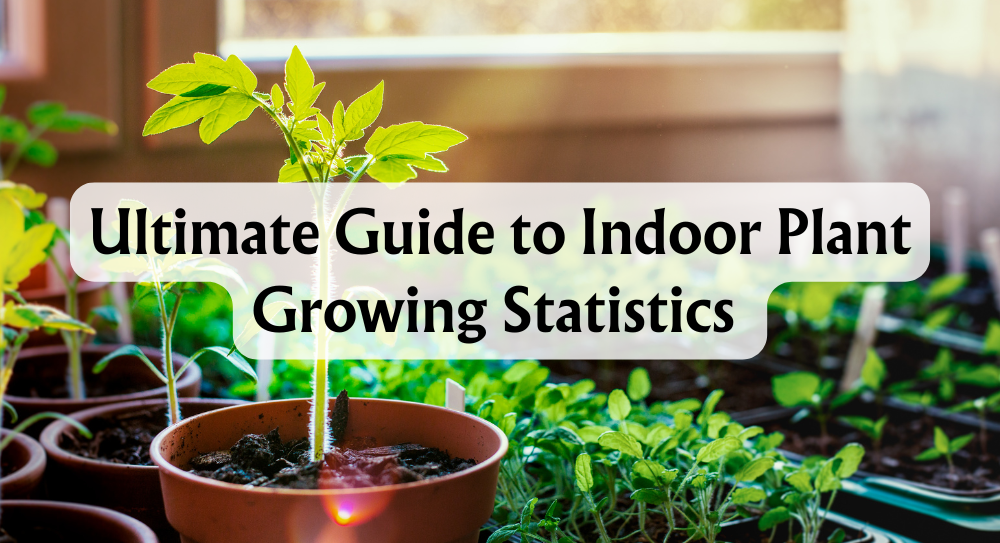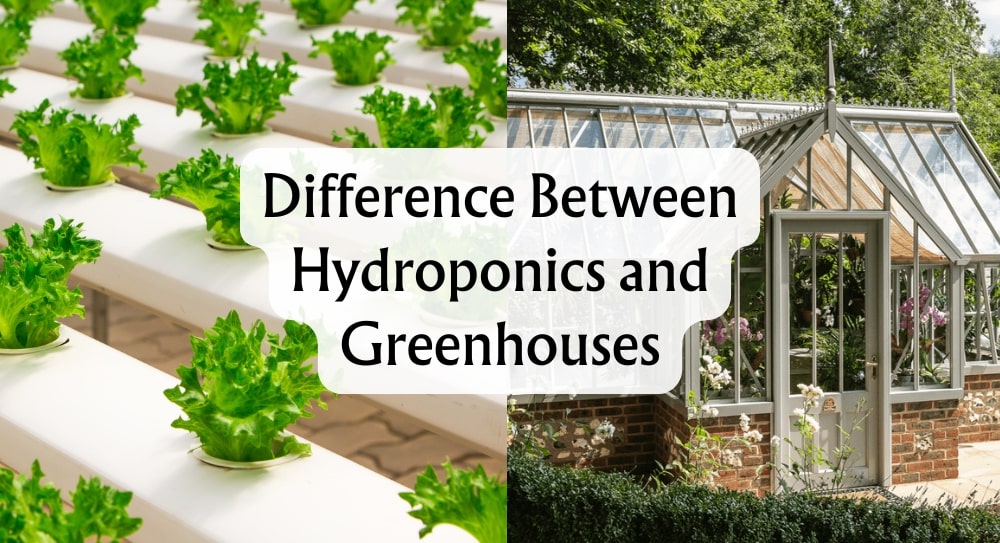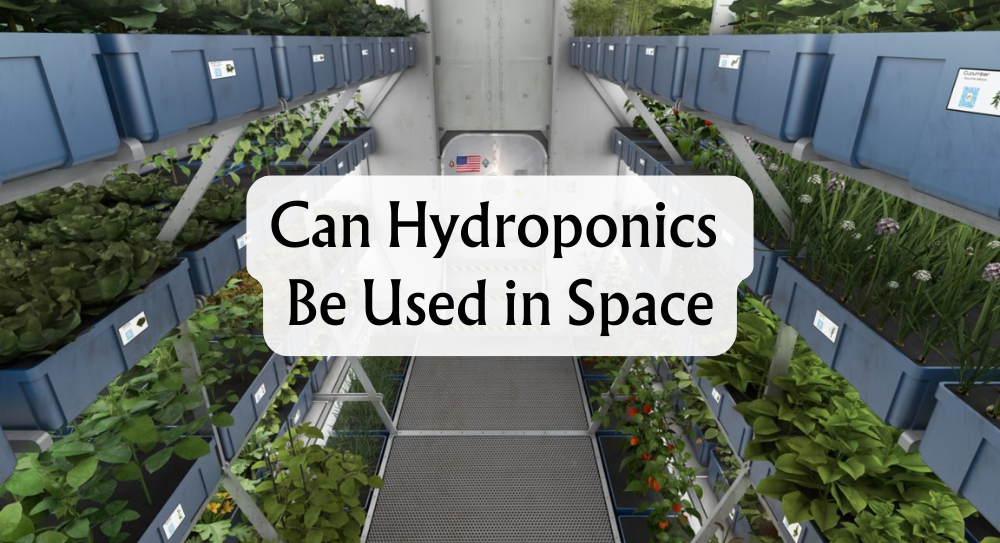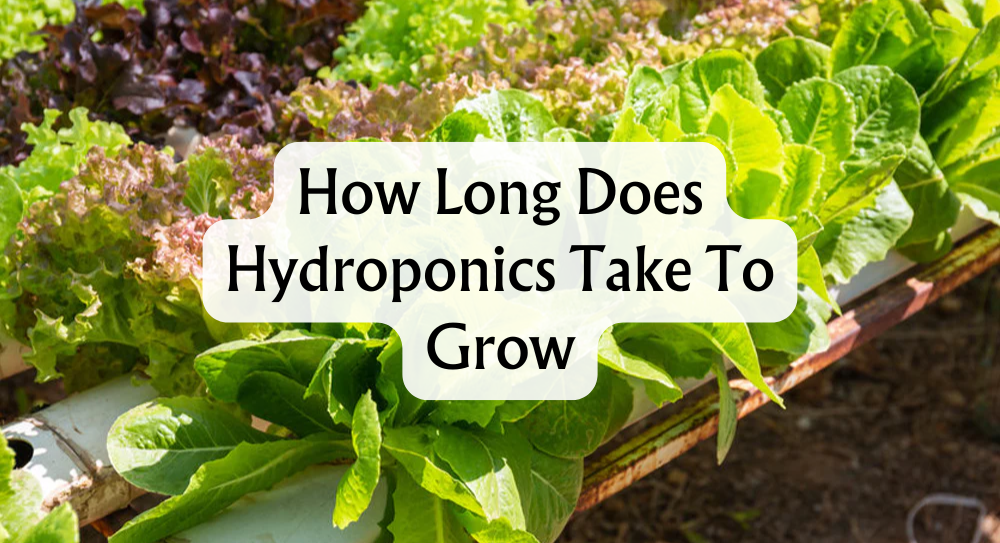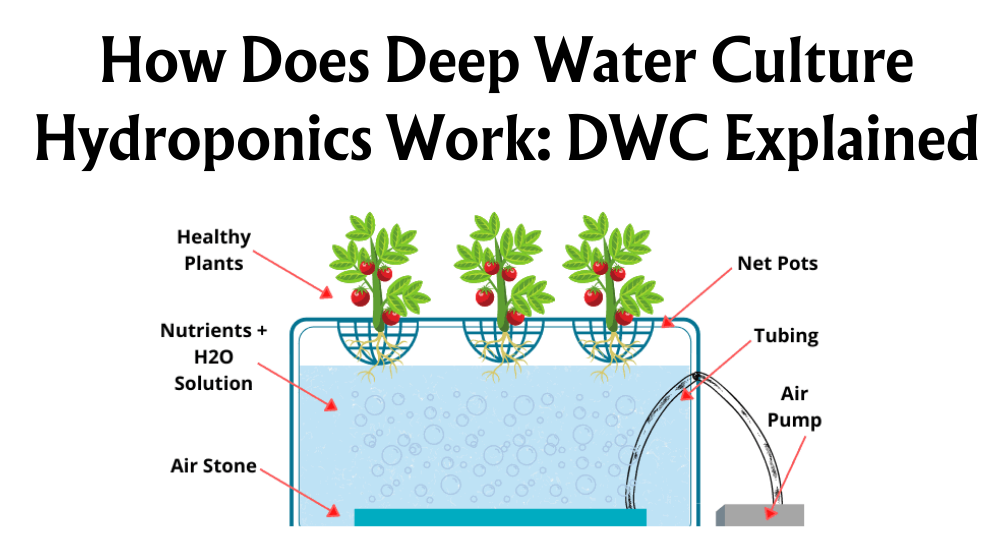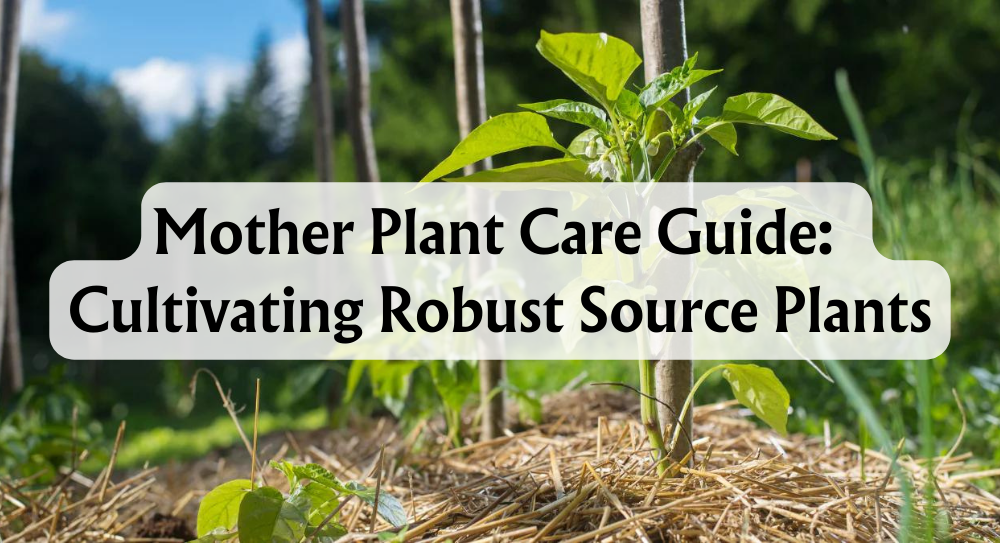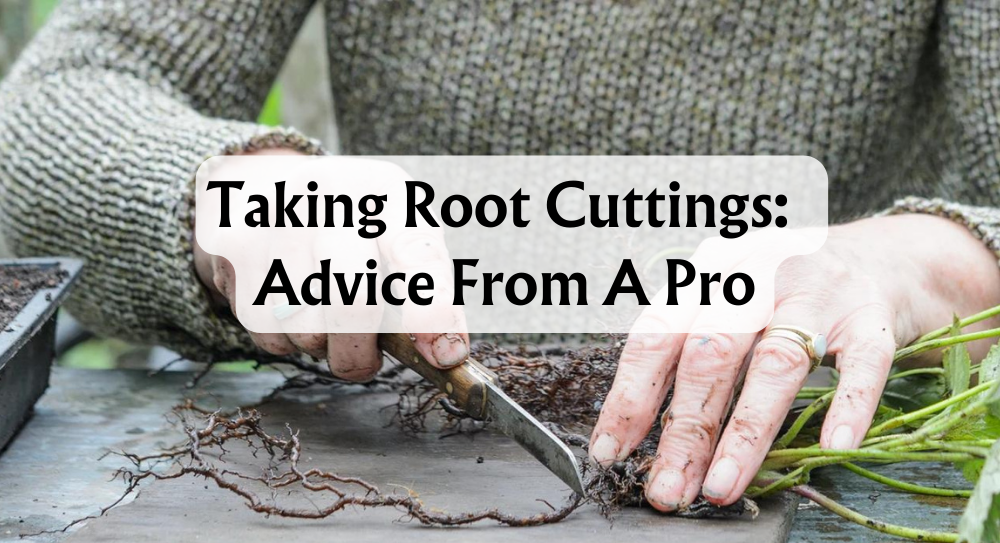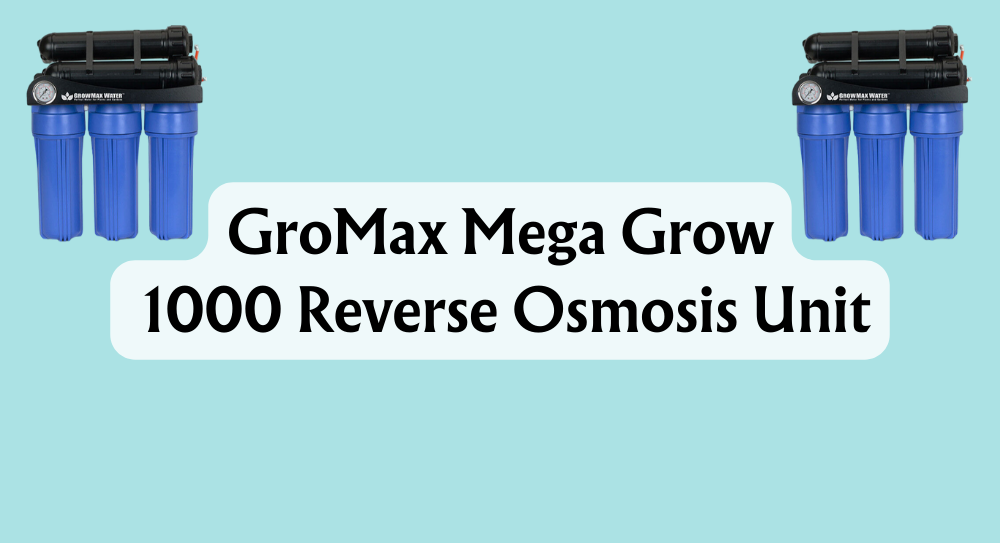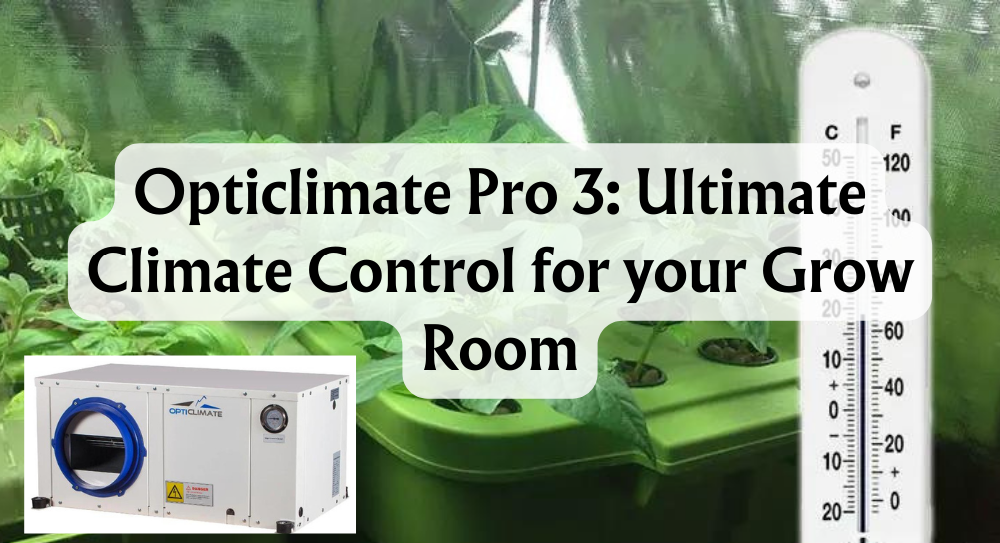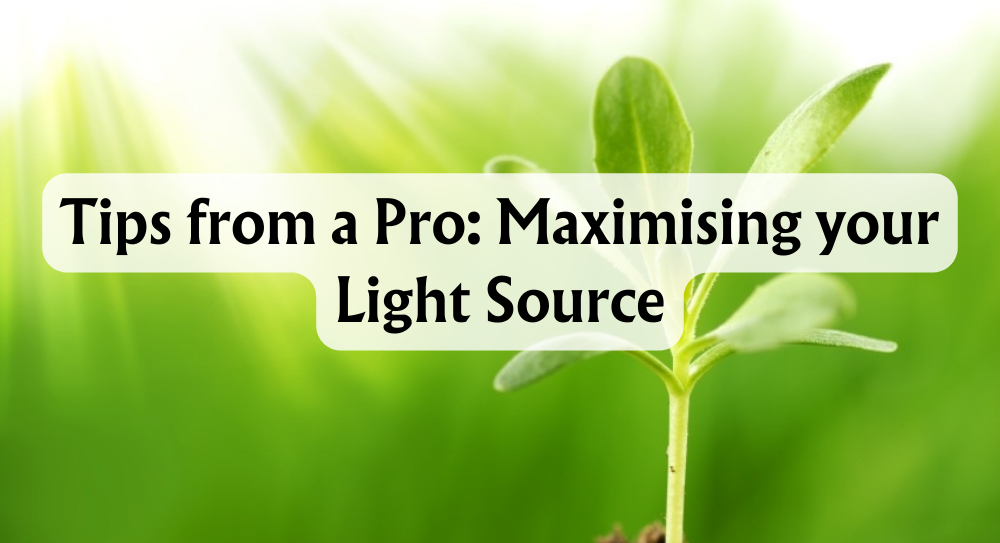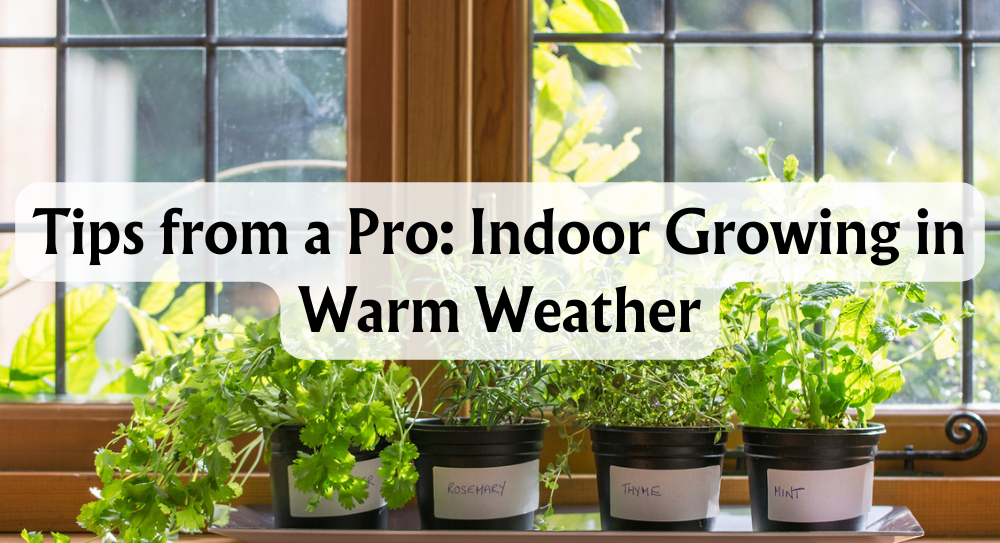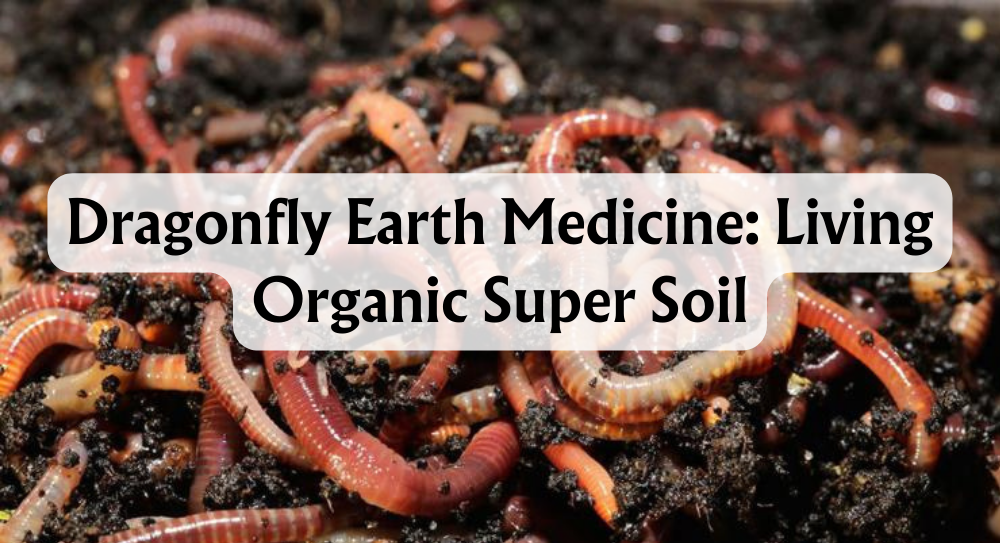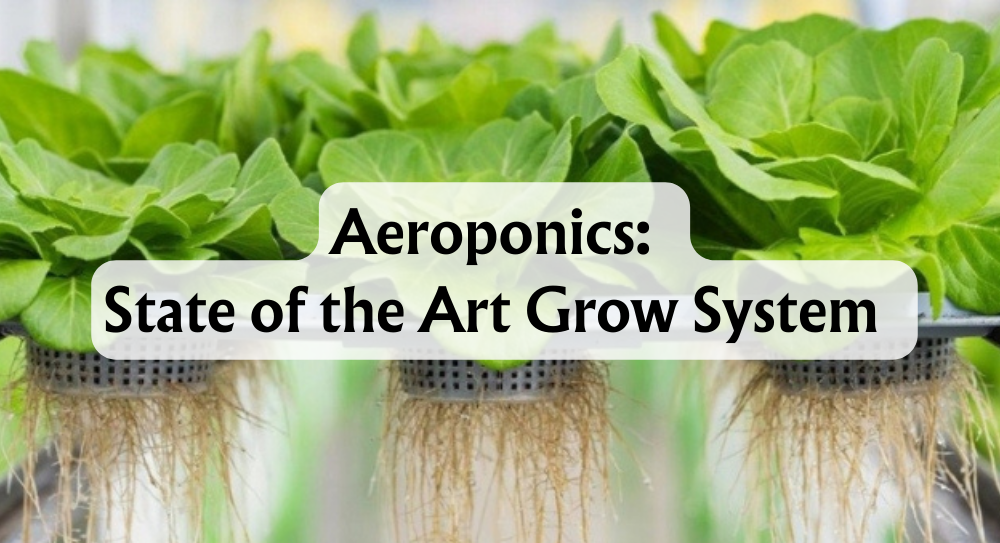The indoor plant industry continues to grow at a rapid rate with almost half of the British population owning a house plant. The Millennial generation sparked a rebirth for houseplants with the passion and interest for indoor plant growing trickling through all generations. This wide demographic of UK indoor plant growers is now so large that we have more information than ever at our fingertips about indoor plant growing. In December 2024, we conducted a survey with 400 participants made up of UK indoor plant growers to understand further the motivations, issues and requirements of indoor plant growers. Following the conduction of this survey, we found some surprising statistics and it is now clear that indoor plant growing is now a major UK hobby with a wide variety of reasons behind primary motivation.
Headline Indoor Plant Growing Statistics
- 58% of respondents reported improved mental health, highlighting the importance of plant life to our overall well-being.
- 68% of indoor plant growers are interested in growing medicinal herbs and other food products accentuating a growing interest in natural healthcare.
- 70% of respondents stated that indoor plant growing has helped them to save money on groceries showcasing that growing your own produce is a cost-effective solution.
- 25% of indoor plant growers have attended a class or workshop identifying that the majority of plant growers learn about indoor plant growing independently.
- 2% of indoor plant growers consider themselves to be experts showing that most are still on their journey of learning about houseplants.
- 99% of participants would recommend indoor plant growing to a friend highlighting the true value and benefits of indoor gardening.
About This Indoor Plant Growing Survey
At the end of 2024, we created a 17-question study designed to understand the needs and incentives of the UK indoor plant growing community. It is important for us to understand both the joys and frustrations of indoor plant growers while considering the challenges and requirements of all demographics. To gain a comprehensive understanding of the indoor plant-growing community as a whole, this study was open to participants of all ages and at every stage of the plant-growing journey. This was crucial to establishing a complete view of UK indoor plant growing including the motives behind getting into indoor plant growing and the issues faced by growers at every stage of the journey. Our respondents consisted of 41% expert gardeners and 7% complete beginners with half of the participants having new to moderate-level experience with indoor plant growing.
To conduct this survey, we used a leading market research provider who ensures research is diverse and representative of the entire market while also filtering respondents through pre-screening who did not meet our criteria. Thanks to this provider, we were able to gather the data we required quickly and efficiently.
Aesthetic Appeal and Mental Well-being are the Top Motivators for Indoor Plant Growing
Our first question to participants was ‘What motivated you to start indoor gardening?’ and we received great results. With an impressive 57.21%, the primary motivation for beginning indoor plant growth was aesthetic appeal. Houseplants are fantastic for adding colour (flowering plants), texture and interest to home decor with many indoor plant growers purchasing their first house plant based on attractiveness.
Coming in at a close second, 55.29% of respondents were motivated by the mental health benefits of indoor gardening. In addition, 29.67% of respondents see indoor gardening as a way to improve their physical health. Houseplants are great contributors to both mental and physical health with more than half of participants getting started with indoor plant growing to support their wellbeing.
We also had 38.47% growing for fresh produce throughout the year and 14% incentivised by financial savings. Plus, 30.23% of respondents are driven by the desire to reduce their carbon footprint and practice sustainable living.
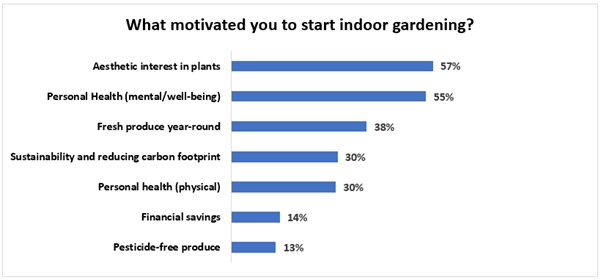
41% of UK Indoor Plant Growers are Experienced
One of the most important things that we wanted to know was the experience level of indoor plant growers so we asked the question ‘How long have you been practising indoor gardening?’. The majority of respondents have been practising indoor gardening for more than a year, with a significant portion having over three years of experience. When it comes to experienced indoor gardening of more than 3 years, 41% of indoor plant growers have this expertise while 35.4% have more moderate experience. Newer indoor gardeners (less than a year) make up a smaller, but notable, segment of the population with 7% of participants growing houseplants for less than 6 months.
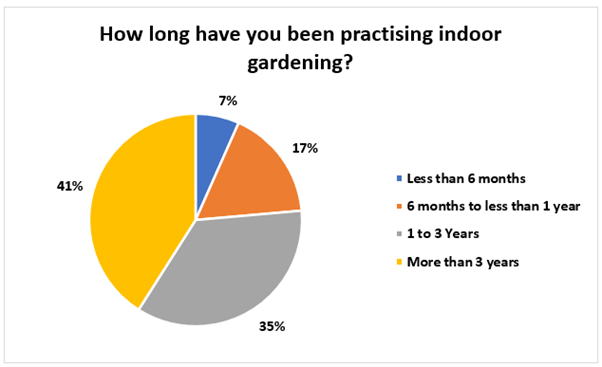
Lack of Space is the Biggest Challenge of Indoor Plant Growing
When it comes to the challenges faced by indoor plant growing conditions in the UK, there are multiple frustrations, but lack of space is the biggest issue. With a mean score of 3.6, space to grow houseplants was frequently voted as the largest hurdle for growing plants indoors. The lack of sufficient lighting to grow houseplants closely followed the lack of space with growers struggling to find adequate lighting to keep their plants flourishing. Pests, diseases and poor air circulation or humidity were also highlighted as significant issues while the time commitment of caring for houseplants was also identified as a major challenge.
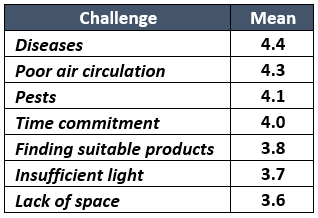
More than Half of Participants Reported Improved Mental Wellbeing and Reduced Stress Levels
When asked how indoor gardening has impacted their lifestyle, our participants reported dramatic results for improved mental well-being and reduced stress levels. Mental health was the most affected with 57.68% of respondents reporting improved mental well-being due to indoor gardening. In addition, just over half of the participants also reported reduced stress levels, highlighting the calming effects of indoor gardening. This study has also highlighted the impact of indoor gardening on physical health with improved air quality, eating habits and sleep quality as well as increased physical activity. The results of this question showcase the huge significance and the important role that indoor plants have on overall health and well-being.
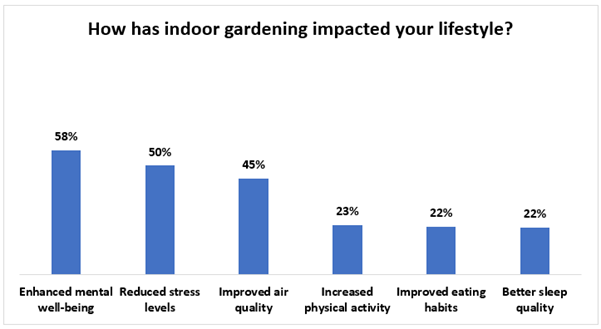
Almost Half of UK Indoor Plant Growers use Sustainable Practices for their Houseplants
This study showcased that indoor gardeners have a strong focus on sustainability, prioritising waste reduction and composting primarily, shortly followed by water and energy conservation. Survey data reveals that nearly half of respondents rate water and energy conservation as very or extremely important whilst waste reduction and composting take the lead with 51.03% of participants emphasising their importance in indoor gardening practices. The use of organic methods is still valued but it ranks slightly lower with a lower 39.06% of respondents considering it very or extremely important. These results show that sustainability remains a critical concern for indoor gardeners.
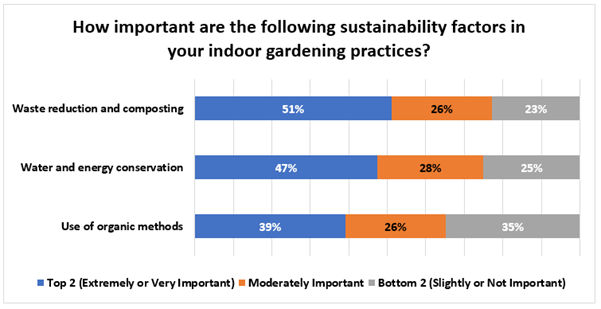
Just 2% of Indoor Plant Growers Consider Themselves to be Experts
Most respondents to the survey consider themselves to be an intermediate level for indoor plant growing. The vast majority voted that they have a moderate ability to maintain a plant with a 59% result. Beginners make up 18.14% of UK indoor plant growers while 20.72% identify as advanced at maintaining plant life. However, the smallest group are those who think of themselves as experts in their ability to maintain plant life indoors with just 2% of the vote.
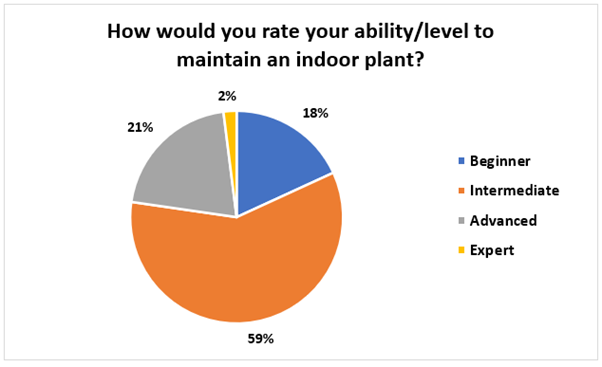
More than 40% of People Garden Solo
Indoor plant growing is a hobby that can be enjoyed both independently or as part of a family. 32.36% of respondents share gardening responsibilities with family members or housemates while 20.99% use indoor gardening as an opportunity to educate children on both plant life and responsibility. Those who do not share responsibility, however, make up 40.28% of participants preferring to manage their indoor plants solo. In addition, some UK-based indoor plant growers are collaborative outside of their family with 19.96% of respondents engaging in collaborative gardening projects and 10.36% hosting workshops to involve others.
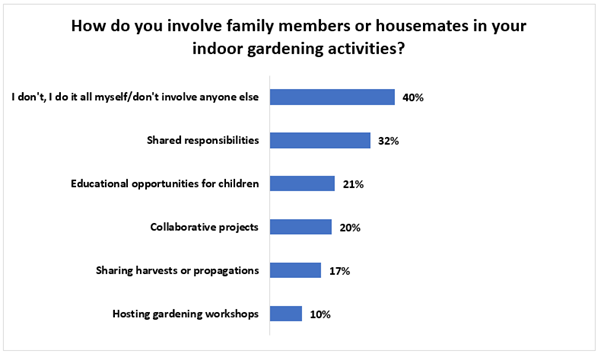
Enjoyment is the Largest Motivator to Grow Food Indoors
Homesteading has become a trend in recent years and more people are growing their own produce. This lifestyle of self-sufficiency has led to a surge of indoor plant growers with food as a result of time and dedication. With a mean score of 2.9, most people grow their own food indoors purely for enjoyment and relaxation. Mental well-being is also a major motivator with physical health benefits following closely behind. Recent years have made mental and physical health a top priority for many individuals with many using indoor growing as a tool. Cost savings, sustainability and convenience over outdoor plants were also motivators at an equal level.
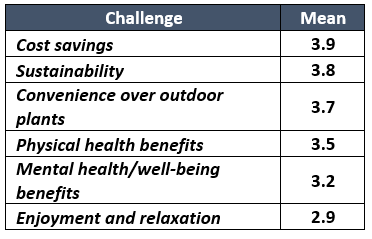
34.37% of Indoor Plant Growers Harvest Seasonally
For those who grow produce indoors, 34.37% harvest seasonally, highlighting that many UK indoor plant growers follow seasonal planting. However, some have more flexibility with 30.57% harvesting as needed. In comparison, 24.93% follow a monthly harvesting schedule while 10.13% harvest weekly. This showcases that UK indoor plant growers are extremely diverse when it comes to planting and harvesting.
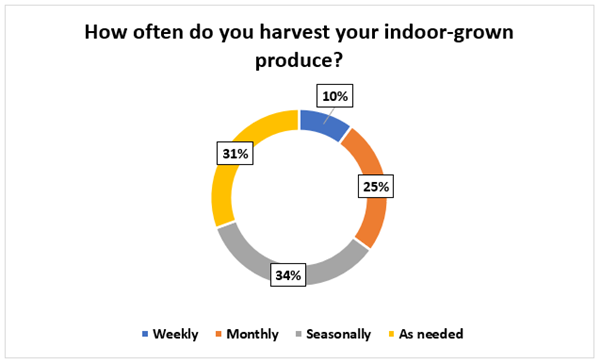
19.28% Never Compost Their Waste
The vast majority of plant growers compost their waste at least some of the time. 34.62% of participants said that they consistently compost their waste with a further 46.10% stating that they do so occasionally. Just 19.28% voted that they never compost the waste from their indoor gardens. These results highlight that the majority of UK indoor plant growers make efforts towards sustainability at least some of the time.
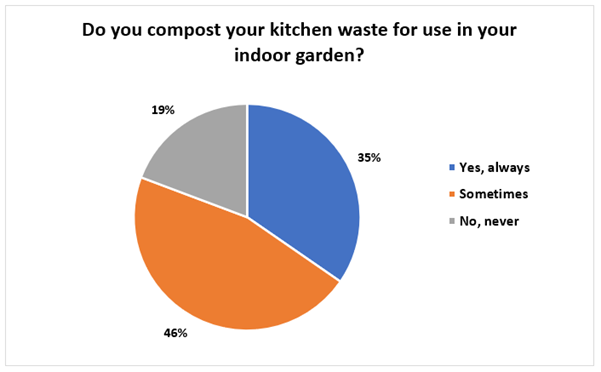
Only 9% of Indoor Plant Growers Have Attended Multiple Workshops
Results from this study showed that most indoor plant growers have learnt independently with only 9% having attended more than one workshop and a further 25% having attended just one. 37.66% of respondents have never attended a workshop or class but are interested or planning to while 28.42% have never attended a class but also do not intend to. The fact that the vast majority of indoor plant growers have not attended a workshop shows that most are self-taught.
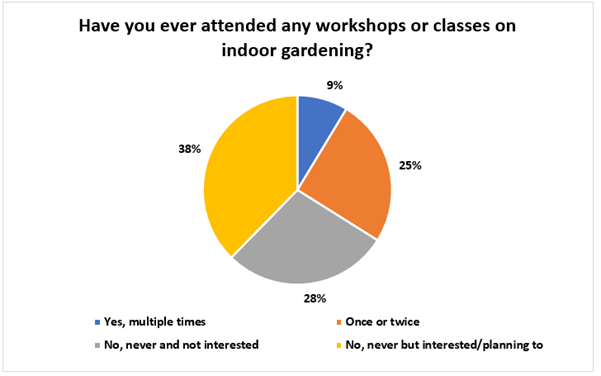
Moderate Levels of Importance on Organic Indoor Gardens
The importance of maintaining a completely organic indoor garden was varied amongst respondents but most lean toward moderate to high importance. A notable 31.12% of respondents placed the importance of having an organic indoor garden in the high range, reflecting a significant interest in organic gardening. Meanwhile, 28.07% gave it just moderate importance and at the lower end, 20.90% rated the importance of an organic garden in the lowest range. Interestingly, none of the respondents rated the importance of having a completely organic indoor garden in the very high range, highlighting that while organic gardening holds appeal, it is not the top priority for most indoor gardeners suggesting that there is a balanced view of where organic methods are valued but not essential.
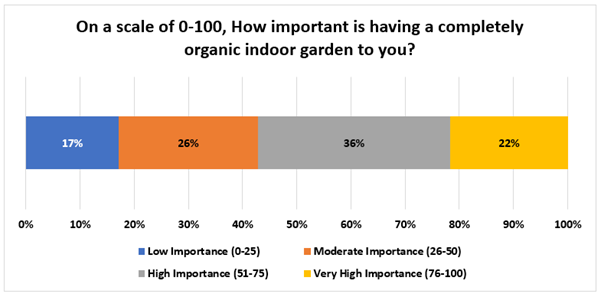
99% of Indoor Plant Growers Would Recommend it to a Friend
When UK indoor plant growers were asked in our survey if they would recommend indoor gardening to others, just 0.98% said that they would not. The vast majority at 67.38% said that they would definitely recommend while a further 31.65% stated that they would probably recommend. These great statistics show that indoor plant growers in the UK value the benefits of indoor plant growing so much that they would endorse the practice.
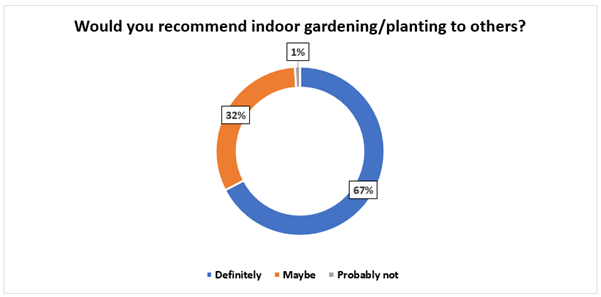
Most Indoor Plant Growers are Interested in Growing Medicinal Herbs
With question 14, we asked participants ‘Would you be interested in growing plants beyond food, like medicinal herbs, if you had the right setup?’. The vast majority of respondents stated that they would have an interest with 35.13% saying definitely, 33.26% voting probably and a further 22.08% as a maybe. Less than 10% voted between probably not and definitely not, highlighting that most indoor plant growers would be interested in growing plants beyond food. This can showcase the growing interest in natural medicine and healthcare.
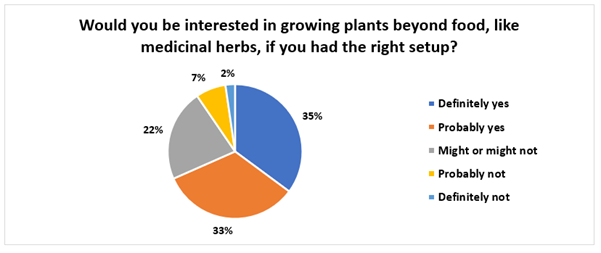
The Importance of Food Security in Growing Food Has Mixed Results
The most split views we received were on whether participants viewed self-sufficiency and food security as a motivation behind growing food indoors. Results were extremely similar with 20.36% of respondents rating the importance of self-sufficiency or food security in the lowest range, 29.5% giving it moderate importance and 28.35% putting it high on the level of importance.
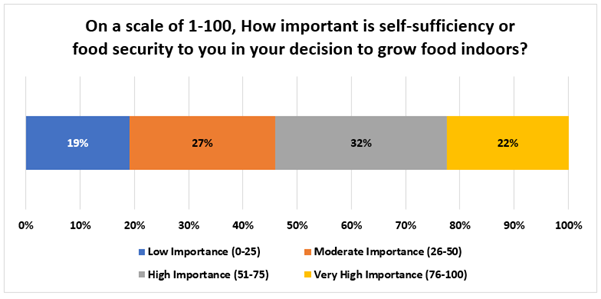
70% of Indoor Plant Growers Save Money
We asked our panel of indoor plant growers whether growing food indoors has helped them save money on groceries and the vast majority said that it did. An impressive 55.68% said it has definitely helped their grocery spending while an additional 14.33% stated it made a considerable impact. While 7.35% of participants were unsure of the impact on grocery bills, 22.64% do not feel like it has made any difference to their food budget. On the whole, most UK indoor plant growers have felt the benefit of indoor gardening as a cost-efficient way to support their household.
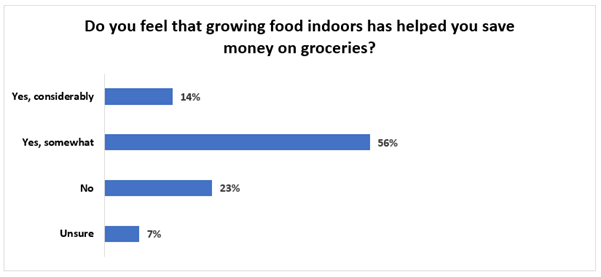
The Majority of Indoor Gardeners Feel Positively About Their Environmental Impact
Indoor gardeners generally feel good about the environmental impact of their practices, with a significant majority expressing high levels of positivity. 19.08% report being extremely positive while an additional 43.33% of respondents feel very positive about the environmental benefits of their indoor gardens. A further 25.07% have a moderately positive view with a smaller group of 5.95% feel slightly positive. Although 6.56% are unsure of their opinion, most indoor gardeners have a solid appreciation for the eco-friendly aspects of their own efforts.
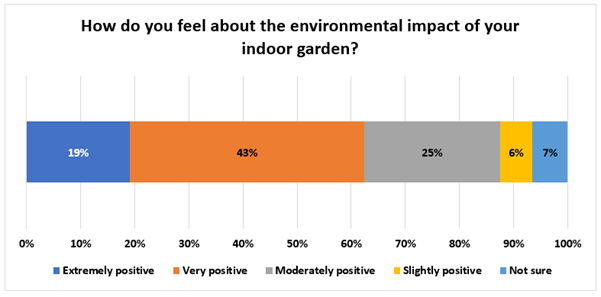
Indoor Plant Growing Trends Conclusion
There is no doubt that the major benefits of indoor plant growing are related to mental and physical health with wellbeing also the top motivator behind getting into indoor gardening. While many indoor gardeners are at an advanced level with more than three years of experience, the indoor plant-growing community is constantly welcoming beginners just starting the journey with houseplants. With indoor gardening communities growing, it is evident that there is a need for solutions, particularly regarding lack of space and lack of lighting. Although there may be challenges with indoor gardening, the benefits certainly outweigh them with most plant growers saving money, and feeling positively about their environmental impact. The industry will continue to grow and this data, along with subsequent market research, can help us to redefine the future of indoor plant growing by creating solutions to iron out frustrations and supporting new indoor gardeners along their journey.







 Store Locator
Store Locator
